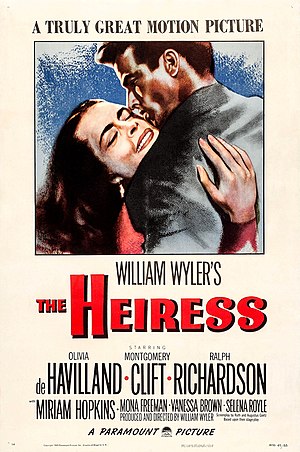The Heiress (film)
Jump to navigation
Jump to search
| The Heiress (film) | ||||||||||||||||||||||||||||
|---|---|---|---|---|---|---|---|---|---|---|---|---|---|---|---|---|---|---|---|---|---|---|---|---|---|---|---|---|
This film has been preserved in the National Film Registry in 1996.
| ||||||||||||||||||||||||||||
 | ||||||||||||||||||||||||||||
|
The Heiress is a 1949 American romantic drama film directed and produced by William Wyler, from a screenplay written by Ruth and Augustus Goetz, adapted from their 1947 stage play of the same title, which was itself adapted from Henry James' 1880 novel Washington Square. The film stars Olivia de Havilland as Catherine Sloper, a naive young woman who falls in love with a handsome young man despite the objections of her emotionally abusive father who suspects the man of being a fortune hunter. Montgomery Clift stars as Morris Townsend, and Ralph Richardson as Dr. Sloper.
Why It Rocks
- The film stays true to the play and the novel. (Even if it's not a particularly faithful adaptation) The theme was the age-old conflict between love and money (represented by social class).
- Great acting from the most of the actors
- Olivia de Havilland provides a masterful performance with transformative qualities, and spine-chilling coldness, hardness and strength she exhibited after being cruelly manipulated by a gold-digger suitor. Her gathering strength as a woman mirrored the social milieu in which the film was shown - the post WWII era when women were assuming stronger positions in US society.
- Richardson was far superior to his costars, something Wyler exploited during the film's production, just as he exploited Clift’s disdain for de Havilland. She feared being upstaged by Richardson, and in fact it is difficult to watch anyone else when he is on screen. His consummate skill results in a rigorously controlled performance, his character’s minute gestures and ironic inflections undercutting Catherine’s confidence at every turn. Richardson’s genius is partly in playing Dr. Sloper not as a villain but as a man damaged by grief and self-pity, entrenched in the certainty that he has been cheated out of a good wife, with only a bad daughter to show for it.
- Austin Sloper is typically shot from a low angle to increase his physical and intellectual dominance over the other characters. Richardson is very specific about making eye contact with de Havilland and Clift, and he has Sloper turn away from his daughter whenever he is about to say something hurtful. Often he is positioned in the foreground of the frame, where his haughty reactions can register more strongly. At other times he hovers in the background, his disapproval silent but obvious. It is a brilliant performance, easily the best in the film, with Betty Linley being the only person coming close.
- Almost the entire historical melodrama took place on set in the austere Washington Square Victorian house (in New York City's Greenwich Village), reflecting the film's roots on the stage.
- Icy and haunting musical score from Aaron Copland that punctuates the inflexibility and deliberate grandeur of 1880s New York Society that Henry James depicted.
- Great costume work from by Edith Head.
Bad Qualities
- Montgomery Clift was ill-suited for a period role such as Morris Townsend due to his voice being too modern, and it's likely his casting was the result of commercial calculations, or maybe Wyler sensed that Clift’s difficulty connecting to de Havilland personally would add to the ambiguity of his screen character.